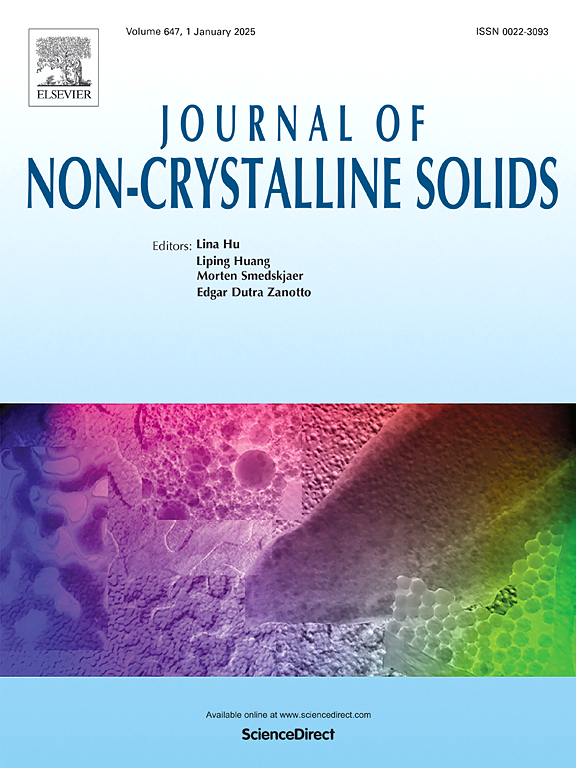Elastic properties of Fe95-yNb2Mo2Cu1Siy-xBx (x=5-8, y=20-26) at % amorphous alloys
IF 3.2
3区 材料科学
Q1 MATERIALS SCIENCE, CERAMICS
引用次数: 0
Abstract
Amorphous materials exhibit complex atomic structures characterized by the absence of long-range order, in contrast to the well-defined periodicity of crystalline materials. This structural complexity is further pronounced in compositions such as FeMCuSiB (M = Nb, Mo, W and Ta), which incorporate elements with varying atomic radii and valencies. The Young's modulus of structures generated using traditional methods, such as melt-quenching and random packing, shows poor agreement with experimental data. In this study, we employ hybrid methods for generating the structures, which involve randomly packing elements without overlap, followed by thermalization at room temperature using Ab-initio Molecular Dynamics simulations. The Young's modulus evaluated from these structures aligns well with values measured using Dynamic Mechanical Analysis. Additionally, we utilize these structures to determine other elastic moduli including the bulk modulus and tetragonal shear modulus and find that the obtained values are consistent with the expected range for these compounds. We attribute the improved accuracy to a more representative approximation of the amorphous structure and the direct application of energy-strain relationships, rather than stress-strain relationships, for elastic moduli determination. Our methodology facilitates reliable predictions of the physical properties of amorphous materials and contributes to the design of FeMCuSiB (M = Nb, Mo, W and Ta) alloys with enhanced mechanical properties.
Fe95-yNb2Mo2Cu1Siy-xBx (x=5-8, y=20-26) % 非晶合金的弹性特性
无定形材料显示出复杂的原子结构,其特点是缺乏长程有序性,与晶体材料明确的周期性形成鲜明对比。这种结构的复杂性在 FeMCuSiB(M = Nb、Mo、W 和 Ta)等成分中更为明显,这些成分中的元素具有不同的原子半径和原子价。使用熔体淬火和随机堆积等传统方法生成的结构的杨氏模量与实验数据的一致性很差。在本研究中,我们采用混合方法生成结构,包括无重叠地随机堆积元素,然后利用 Ab-initio 分子动力学模拟在室温下进行热处理。从这些结构中评估出的杨氏模量与使用动态力学分析法测得的数值非常吻合。此外,我们还利用这些结构测定了其他弹性模量,包括体积模量和四方剪切模量,并发现所获得的数值与这些化合物的预期范围一致。我们将精确度的提高归功于对无定形结构进行了更具代表性的近似,以及在弹性模量测定中直接应用了能量-应变关系而非应力-应变关系。我们的方法有助于可靠地预测非晶材料的物理性质,并有助于设计具有更强机械性能的 FeMCuSiB(M = Nb、Mo、W 和 Ta)合金。
本文章由计算机程序翻译,如有差异,请以英文原文为准。
求助全文
约1分钟内获得全文
求助全文
来源期刊

Journal of Non-crystalline Solids
工程技术-材料科学:硅酸盐
CiteScore
6.50
自引率
11.40%
发文量
576
审稿时长
35 days
期刊介绍:
The Journal of Non-Crystalline Solids publishes review articles, research papers, and Letters to the Editor on amorphous and glassy materials, including inorganic, organic, polymeric, hybrid and metallic systems. Papers on partially glassy materials, such as glass-ceramics and glass-matrix composites, and papers involving the liquid state are also included in so far as the properties of the liquid are relevant for the formation of the solid.
In all cases the papers must demonstrate both novelty and importance to the field, by way of significant advances in understanding or application of non-crystalline solids; in the case of Letters, a compelling case must also be made for expedited handling.
 求助内容:
求助内容: 应助结果提醒方式:
应助结果提醒方式:


